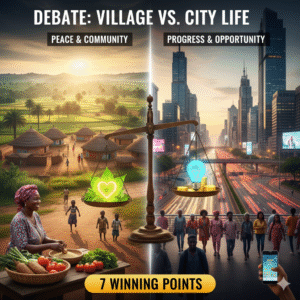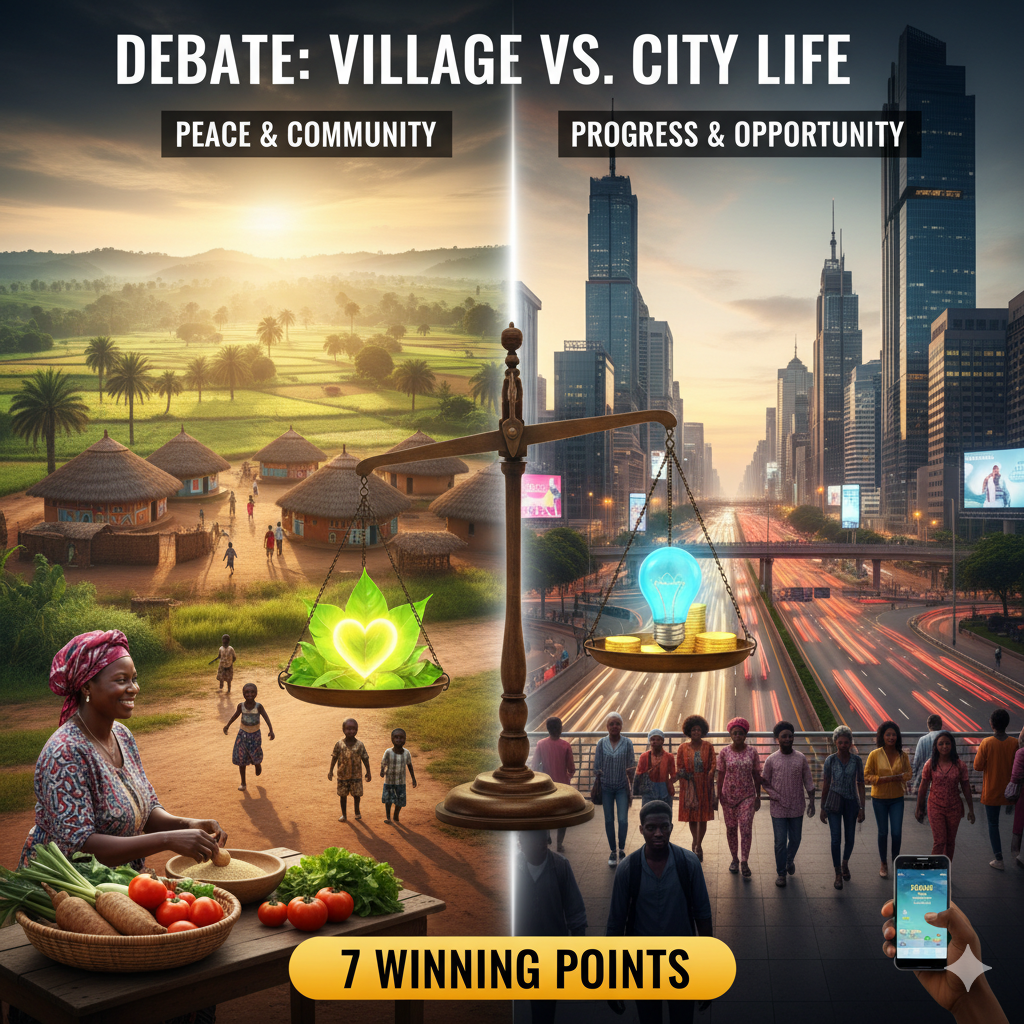Debate: 7 Winning Points on Why Village Life is Better Than City Life
Debate: 7 Winning Points on Why Village Life is Better Than City Life
Looking for the winning arguments for your next school debate? You’ve come to the right place. Today, we’re tackling a classic motion: “Is village life better than city life?”
This post gives you the complete, winning script for the ‘supporting’ side. If you need the best debate points to argue that village life is indeed better, you’ve found them. This is your full guide with the top is village life better than city life debate points to help you win.
First, let’s define our terms. “Village life” (or rural life) means living in smaller, close-knit communities, often surrounded by nature. “City life” (or urban life) means living in large, crowded, and fast-paced areas like Lagos, Abuja, or Port Harcourt.
Disclaimer: This is a template for an educational debate. The goal is to help you argue your side effectively. It’s not to say that city life or the people living there are bad. All lifestyles have value and are important for Nigeria!

Winning Debate Points on Why Village Life is Better
Good day, Mr. Chairman, panel of judges, accurate timekeeper, co-debaters, and my fellow students. I am here today to passionately argue that village life is, without a doubt, better than city life. My points are as follows:
1. The Unbeatable Advantage of Peace and Mental Well-being
My first point is about our minds.
Imagine this: You wake up to the sound of birds, not the blaring horns of okadas and danfos at 5 AM. This is the first, and biggest, advantage of the village.
City life is a life of constant stress, noise, and pressure. The village offers a peaceful environment and a slower pace of life. This isn’t just ‘nice’; it’s critical for our mental health. As students, we need to be able to focus. The city is full of distractions that wage war on our concentration. In the village, you have the peace and quiet to actually study, think, and grow.
2. A Healthier Lifestyle with Fresh Air and Clean Food
My second point is about our physical health. Let’s be honest, many of our cities are polluted. The air is often thick with fumes from thousands of cars, generators, and industrial sites.
This isn’t just my opinion. Major organizations like the World Health Organization (WHO) consistently warn about the dangers of urban air pollution and its direct link to asthma, lung disease, and other serious health problems.
In the village, you breathe fresh air. You get a healthier lifestyle by default. You eat fresh food, often straight from the farm, not food that has been preserved with chemicals and transported for days. This quality of health is something city money cannot easily buy.
3. The Power of a Strong Sense of Community
In a big city, you can live in a compound for 10 years and not even know your neighbour’s name. It can be a life of anonymity and isolation.
My third point is the strong sense of community in the village. In the village, ‘everyone knows everyone.’ This isn’t a bad thing; it’s a support system. When someone is in trouble, the community gathers to help. When it’s time for a festival, everyone celebrates together. This teaches us important societal values. It’s a support network that the city just can’t match.
4. A Significantly Lower Cost of Living
Let’s talk about money. Everything in the city is expensive. House rent in Lagos? It’s crazy. Transportation from one end of the city to the other? It drains your pocket.
The lower cost of living in the village is a massive advantage. Food is cheaper. Accommodation is affordable. You can walk to most places. This means our families face less financial pressure. As students, this allows us to focus on our education instead of worrying about how our parents will pay for the next bill.
5. Drastically Better Safety and Security
My opponents will talk about development, but what is development without safety?
The crime rate in big cities is, factually, higher. It’s just a result of overcrowding and anonymity. Villages are generally safer. Children can play outside without the constant, high-level fear of kidnapping or ‘one-chance’ buses. This safety and security is a fundamental human need that the village provides far better than the city.
6. Preservation of Our Culture and Traditions
My sixth point is about our identity. What happens in the big cities? Everyone is in a rush, and many people are trying to copy foreign cultures. Our native languages, our traditions, and our local festivals are often forgotten.
The village is the heartbeat of our cultural preservation. This is where you hear our languages spoken with pride. This is where festivals are celebrated with their true, original meaning. To lose the village is to lose our soul. And as I stand here, I am reminded that a wise man, as our elders would say, never forgets his roots—a lesson you can deliver powerfully using brilliant debate proverbs that captivate judges
7. More Space and a Direct Connection to Nature
Finally, city life is a life lived in a “box.” You live in a small apartment, you go to school in a crowded classroom, and you play on a concrete field.
The village offers space. It offers a direct connection to nature. This is not just for farming. It’s for playing, exploring, and learning about the world in a real, practical way. This connection to the natural world is essential for a balanced human being.
Thank you.
Frequently Asked Questions (FAQs)
What’s the strongest argument for the other side (city life)? Your opponents will definitely talk about better schools (universities), advanced hospitals, and more job opportunities. Your best counter-argument is to ask: “What is the use of a big university if the student is too stressed to learn? What is the use of a big hospital that is only treating illnesses caused by the city’s pollution? And what is the use of a high-paying job if you have no peace of mind or strong community?”
How do I start my debate speech? A great greeting is key. You must be confident and address the panel of judges and your audience correctly. We’ve actually got a full guide on that. Check out our post on how to start a debate greeting in secondary school.
What’s the best way to conclude this debate? Summarise your strongest points. End with a powerful, memorable sentence. For example: “My opponents have argued for the ‘fast life’ of the city. I have proven that the ‘good life’—a life of health, peace, community, and safety—is found only in the village. Thank you.”
Conclusion / Summary
So, there you have it! The argument that village life is better is not just about feelings; it’s about facts. It’s about a healthier lifestyle, a stronger community, a lower cost of living, and a safer, more peaceful environment.
Final Disclaimer: Remember, these is village life better than city life debate points are for your educational competition. In reality, Nigeria needs both its vibrant cities and its peaceful villages to grow. We need our farmers and we need our bankers.
What do you think? Did I miss any strong points? Drop your opinions in the comments section below!
Also, feel free to share this post with your coursemates or those in your debate team!








2 Comments